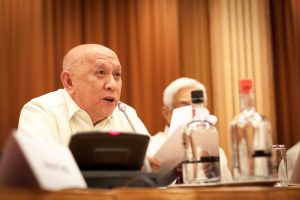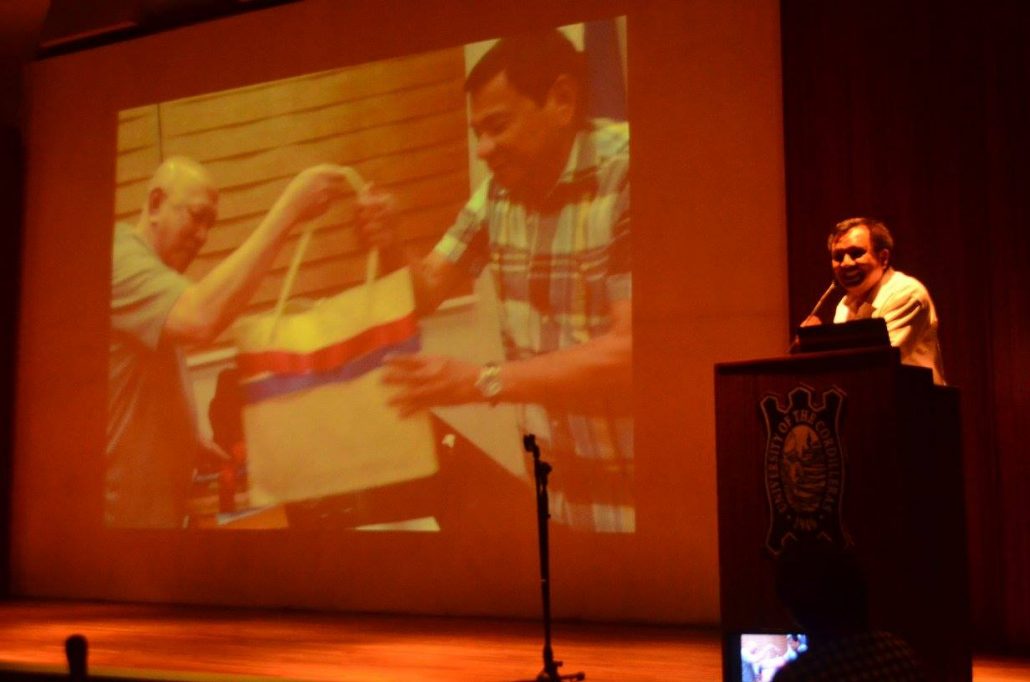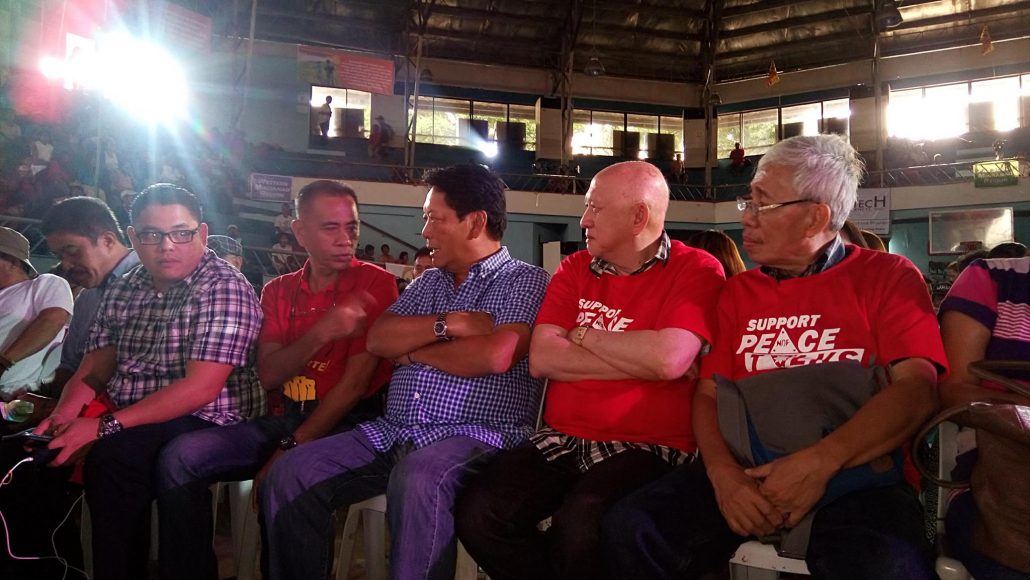1. Context of peace negotiations between National Democratic Front of the Philippines (NDFP) and the Government of the Philippines (GPH)
There is an ongoing civil war in the Philippines between the the NDFP and the GPH. The NDFP represents the forces of workers, peasants, the poor, and the patriotic and progressive elements fighting for national and social liberation. The GPH represents the forces of the local ruling classes of big landlords and compradors supported by foreign monopoly capitalists. The civil war has been going on for the last 46 years, and is a continuation of the first democratic revolution against Spain in 1896 and the Philippine-American war in 1898.
In effect, two states exist in the Philippines: the revolutionary one, representing the people’s democratic government that has effective control over an extensive portion of the population and territory with democratic organs of political power in 71 out of 81 provinces in the country; the other, the counterrevolutionary Manila government, representing the foreign and domestic oppressors and exploiters.
To attain a just and lasting peace in the country, it is necessary to transform the semi-feudal and semi-colonial Philippine social system into a sovereign, democratic and just society through the implementation of, among others, genuine land reform; a program of national industrialization that is free from the dictates of neo-liberal globalization; an enlightened social policy that provides just wages, better living conditions, free education, health care and housing to the people; and an independent foreign policy that relates on sovereign equal terms and mutual respect with all states and nations and is in solidarity with the oppressed and exploited. Without these changes, the Philippines will remain poor, backward, agrarian, dependent and undeveloped – where abject poverty, unemployment and gross inequality rule, where there is widespread hunger, disease and malnutrition, and where illiteracy and homelessness prevail. These very conditions are the roots of the armed conflict.
2. Description of the peace negotiations: participants, length, reaction of society, agreement achieved and signed and if there is a ceasefire during the talks
The peace negotiations between the NDFP and the GPH is governed by the framework agreement called the The Hague Joint Declaration which was signed on 1 September 1992 in The Hague, The Netherlands. The Hague Joint Declaration provides for the following: that the peace negotiations shall be held to resolve the armed conflict; that the objective of the negotiations shall be the attainment of a just and lasting peace; that the peace negotiations must be in accordance with mutually acceptable principles of national sovereignty, democracy and social justice and that no precondition shall be made to negate the inherent character and purpose of peace negotiations; that the agenda of the peace negotiations shall be human rights and international humanitarian law, socio-economic reforms, political and constitutional reforms, and end of hostilities and disposition of forces; and that the peace negotiations shall be carried out through the reciprocal working committees to be created by the Parties that would meet, negotiate and work in sequence on the drafts of the four items of the agenda under the guidance of their respective Negotiating Panels. The two Parties have already signed and approved the Comprehensive Agreement on Respect for Human Rights and International Humanitarian Law (CARHRIHL) in 1998, the first item in the agenda.
After The Hague Joint Declaration in 1992, other important agreements have been signed, such as the Joint Agreement on Safety and Immunity Guarantees (JASIG, February 1995) and its amendment agreements, which provide for the safety and immunity guarantees of the negotiators, consultants, staffers, security and other personnel in the peace negotiations; Agreement on the Ground Rules of the Formal Meetings of the Negotiating Panels (February 1995); and the Joint Agreement on the Formation, Sequence and Operationalization of the Reciprocal Working Committees (RWCs) of the Negotiating Panels (June 1995) and its amendment agreement.
The formal participants in the peace negotiations include the negotiating panels of both sides, their respective consultants and staff, as well as their respective reciprocal working committees and their consultants and staff. The negotiations have been held in mutually acceptable foreign neutral venues abroad (Belgium, The Netherlands and Norway) and have been going on since 1 September 1992 with long periods of impasse, suspension and one formal termination (in 1999), all done by the GPH.
There is no ceasefire between the parties while the peace negotiations are ongoing. The ceasefire will be discussed and settled in the last item of the agenda on the end of hostilities and disposition of forces. But there have been short-duration unilaterally-declared or coordinated ceasefires by the Parties during the Christmas season, Holy Week, periods of disasters (typhoons, earthquakes, etc.) and releases of prisoners of war.
The peace negotiations have been welcomed by the people at large and are supported by people’s organizations of workers, peasants, women, youth and students, urban poor indigenous peoples, civil-society groups, human rights institutions, religious and lawyers’ groups, academe, and patriotic and progressive groups and personalities.
3. What is the agenda of the peace negotiations? How was the agenda established? What were the difficulties? What effects did it have internally in the group, on the society, the political elite in the country?
As mentioned in paragraph 1 of number 2 above, the agenda of the peace negotiations have been established in the framework agreement called The Hague Joint Declaration. These are: human rights and international humanitarian law; socio-economic reforms; political and constitutional reforms; and end of hostilities and disposition of forces. These four items in the agenda are to be discussed, agreed upon, signed and approved in sequential order.
As previously mentioned, the first item has already been signed and approved in 1998. The CARHRIHL is guided by, among others, the UN Declaration on Human Rights, the UN Covenant on Civil and Political Rights and the UN Covenant on Economic, Social and Cultural Rights. This Agreement is important in ensuring that while the armed conflict is going on, the two parties are bound to respect human rights and international humanitarian law in the conduct of war.
The agenda on socio-economic reforms is the meat of the peace negotiations because it addresses the roots of the armed conflict. To be taken up in this agenda are the longstanding issues of landlessness of the majority of the people (land reform and rural development), poverty and unemployment (national industrialization), national sovereignty and independence (against the policy of neo-liberal globalization, foreign interference and domination, etc.), enlightened social policy (free health, education, housing, etc.), and an independent foreign policy, among others.
The third item on political and constitutional reforms shall be the consequence of the agreement on socio-economic reforms. It shall define the political and constitutional structure and arrangement in accordance with the agreements reached on socio-economic reforms, for instance, the adequate and full representation of the workers and peasants who compose the majority of the Filipino people in decision and policy-making and governance.
The fourth item on the end of hostilities and disposition of forces shall define the agreement on the process of ending of the armed conflict and delineate the disposition of the armed forces of both parties.
Since 1998, the GPH-NDFP peace negotiations have been bogged down on the second item of the agenda. The ruling classes (economic and political elite) have shown great resistance in continuing and finishing the negotiations to address the roots of armed conflict, despite the general consensus and clamor by the people for basic reforms in the social system to end massive poverty, inequality and corruption in government.
The two Parties have already submitted their respective drafts on a comprehensive agreement on social and economic reforms and have formed their respective Reciprocal Working Committees (RWCs) to negotiate and work on the tentative draft of the agreement. The RWCs have already succeeded in forging a common draft on the Declaration of Principles. The GPH has adamantly refused to talk about land reform and national industrialization. It considers these matters as “loaded” categories, even though these are undoubtedly bourgeois democratic – and not socialist – demands that were carried out in countries that managed to industrialize in the post World war II period such as South Korea and Taiwan, as well as in England and other countries of Europe before the so-called Industrial Revolution and the US in the aftermath of the American civil war.
4. How has been the participation? Direct or Indirect? How was the participation of the different groups of the society? What about the participation of the popular classes?
These questions have partly been answered in the last paragraph of number 2 above. At any rate, there have been direct and indirect participation by the people in the peace negotiations. For instance, the CAHRIRHL has been disseminated, discussed and studied by the revolutionary movement both in the cities and countryside through the movement’s organs of political power, mass organizations, committees, and the guerrilla fronts and units of the people’s army. Even the mercenary reactionary army has purportedly used the CARHRIHL to educate its troops and security forces on human rights and international humanitarian law.
In urban centers, people’s organizations and civil society groups engaged in human rights and peace advocacy have regularly been holding seminars, forums, mass actions (pickets, rallies, demonstrations) in support of the peace negotiations and the need to address the roots of the armed conflict while pushing for the thorough implementation of the CARHRIHL.
There are still many things to be done to rally full support from the people for the struggle to attain a just and lasting peace in the Philippines. The NDFP is committed to pursue the peace negotiations in order to fulfil the national and democratic aspirations of the Filipino people.
Thank you.

 Your Excellencies from the Royal Norwegian Government, specifically Special Envoy Ambassador Elisabeth Slattum and her team of facilitators,
Your Excellencies from the Royal Norwegian Government, specifically Special Envoy Ambassador Elisabeth Slattum and her team of facilitators,
